Stellar Scholars and Leaders Join UCLA Law
UCLA Law Magazine | Fall 2023 | Volume 46
Outstanding new members boost law school faculty and administration in 2023–24.
New Tenure-Track Faculty
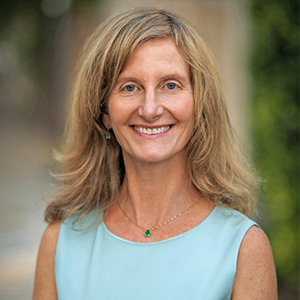 ARIELA GROSS
ARIELA GROSS
Distinguished Professor of Law
A renowned scholar of legal history, Ariela Gross comes to UCLA Law from USC Gould School of Law, where she was the John B. and Alice R. Sharp Professor of Law and History and founder and co-director of the Center for Law, History, and Culture. Gross served on the University of Southern California faculty for 27 years.
A prolific and award-winning writer and speaker, Gross focuses her scholarship on “the way race and slavery have shaped law, culture and politics in the Americas — and also the way law has created the very category of ‘race,’ with devastating consequences.” She is the author of three books that she says “tell the story of enslaved and free people of color who used the law to claim freedom and citizenship for themselves and their loved ones, challenging slaveholders’ efforts to make blackness synonymous with slavery”: With Alejandro de la Fuente, Becoming Free, Becoming Black: Race, Freedom, and Law in Cuba, Virginia, and Louisiana (Cambridge University Press, 2020); What Blood Won’t Tell: A History of Race on Trial in America (Harvard University Press, 2010); and Double Character: Slavery and Mastery in the Antebellum Southern Courtroom (Princeton University Press, 2000). She is currently working on a book to be titled Erasing Slavery: How Stories of Slavery and Freedom Shape Battles Over the Constitution.
Gross has been the recipient of several prestigious honors, including a Guggenheim Fellowship, three fellowships from the American Council of Learned Societies, and book awards from the Order of the Coif for the best book on law and the Law and Society Association for the best book on sociolegal history.
Deeply engaged in service to her community and profession, Gross chaired the Concerned Faculty of USC group, which was created in 2018 “to restore transparency, accountability and faculty governance at the university.” She also co- founded the Law and Humanities Interdisciplinary Workshop for Junior Scholars.
Gross earned her B.A. from Harvard University, her J.D. from Stanford Law School and her Ph.D. in history from Stanford University.
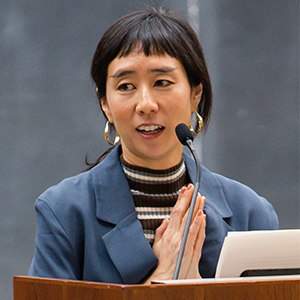 K-SUE PARK
K-SUE PARK
Professor of Law
K-Sue Park will join the law school’s faculty in January 2024. The move is a homecoming for Park, who served as a critical race studies fellow and lecturer at UCLA Law from 2017 to 2019. She comes to UCLA Law most recently from Georgetown University Law Center, where she has been an associate professor of law since 2019.
An award-winning and widely published scholar and author, Park focuses her research on how U.S. property law and the U.S. real estate market have developed vis-à-vis the histories of colonization and enslavement. Her articles have appeared in The University of Chicago Law Review, The Yale Law Journal and Harvard Law Review. Her forthcoming book, under contract with Harvard University Press, has the working title How the Land Made Us: The Untold Story of Race and Property Law in America. As a public intellectual, Park has had work published in The New York Times, among other prestigious publications.
Deeply engaged in on-the-ground legal advocacy, Park has worked for, among other impactful engagements, Texas RioGrande Legal Aid in El Paso as an Equal Justice Works fellow and staff attorney; the Legal Services Center in Jamaica Plain, Massachusetts; and the ACLU Immigrants’ Rights Project in New York City.
Park is a climate cohort fellow with the Emerson Collective. She was the 2022–23 Roger W. Ferguson, Jr., and Annette L. Nazareth Member in the School of Social Science at the Institute for Advanced Study in Princeton, New Jersey. In 2003, she was a Fulbright Scholar in Seoul, South Korea.
Park earned a B.A., summa cum laude, from Cornell University; an M.Phil in social and political sciences, with distinction, from the University of Cambridge; a Ph.D. in rhetoric from UC Berkeley; and a J.D., cum laude, from Harvard Law School.
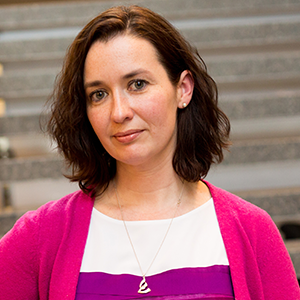 LAURA PEDRAZA-FARIÑA
LAURA PEDRAZA-FARIÑA
Professor of Law
Laura Pedraza-Fariña, a scholar whose work focuses on the cutting edge of developments in science and technology, will join the faculty in January 2024.
She comes to UCLA Law from Northwestern University’s Pritzker School of Law. She has been a member of that law school’s faculty since 2013, including as a professor of law and, since 2021, associate dean for innovation and partnerships. Previously, she was a visiting lecturer and law research fellow at Georgetown University Law Center.
To better understand how innovation happens on the ground, Pedraza-Fariña’s research approaches intellectual property law from a sociological perspective. This work has led her to identify objective markers of creative inventions that can inform the patent granting process, fostering breakthrough innovation. At the same time, Pedraza-Fariña engages in research and scholarship that centers on the intersection of global health and international intellectual property law. For example, a recent project analyzes the relationship between the World Trade Organization and the World Health Organization, whose overlapping regulatory domains lead to a sometimes contentious relationship.
A prolific and widely published author, Pedraza-Fariña has written on these topics in publications that include Iowa Law Review, The University of Chicago Law Review, Northwestern University Law Review, Notre Dame Law Review and the History of Science Society flagship journal Osiris. She also co-authored the book No Place to Hide: Gang, State, and Clandestine Violence in El Salvador (Harvard University Press, 2010).
She earned her J.D., cum laude, from Harvard Law School; her Ph.D. in genetics from Yale University; and her B.A. in chemistry, with honors, from Oberlin College. She also previously worked as an associate at Covington & Burling in Washington, D.C., and as a consultant with the public health watch division of the Open Society Institute (now called Open Society Foundations) in New York City.
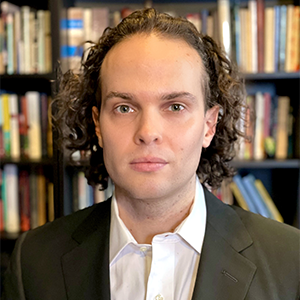 ALEXANDER ARNOLD
ALEXANDER ARNOLD
Assistant Professor of Law
Alexander Arnold’s scholarship uses tools of intellectual and legal history to explore the relationship between law, economic theory and social facts. He often relies on his fluency in several languages to place legal history and economics in a global context, with projects encompassing issues in the United States, Europe and elsewhere.
A prolific writer and speaker, Arnold has presented academic talks that have most recently included “Judicial Economics, Civil Procedure, and the Rise of Economics in Antitrust Law” and “Economic Facts Before Law.” His in-progress writing includes “A History of Judge as Economic Regulator: Procedure and Economic Regulation From Bushell’s Case to the New Deal” and “Law and Economics Before ‘Law & Economics.’” His work has been supported by such institutions as the Mellon Foundation, the Institute for New Economic Thinking, the History of Science Society and the Remarque Institute.
Arnold is a member of the American Society for Legal History, and he served on the advisory board of the Consortium for Intellectual and Cultural History. He comes to UCLA Law from a clerkship with Judge Alvin Hellerstein of the U.S. District Court for the Southern District of New York and from work in trial and appellate litigation in New York. He also previously held positions as a fellow at the École Normale Supérieure in Paris and at the Center for the Administration of Criminal Law, and he served as an instructor in history and law at New York University.
Arnold earned his B.A., Ph.D. in history and French studies, and J.D. degrees from NYU.
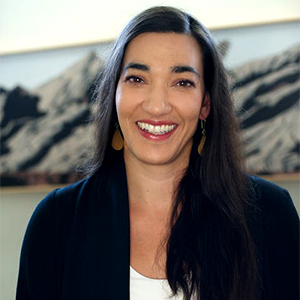 SHIRIN BAKHSHAY
SHIRIN BAKHSHAY
Assistant Professor of Law
Shirin Bakhshay is a legal scholar and social psychologist whose research focuses on criminal adjudication and punishment processes. She comes to UCLA Law from Stanford Law School, where she was a Thomas C. Grey Fellow and lecturer in law from 2020 to 2023.
An award-winning scholar, writer and teacher, Bakhshay has written articles and delivered presentations on the psychological impact of the criminal justice system, including issues involving jail isolation, torture and pretrial publicity. Her current scholarship examines the psychology of punishment and explores lay beliefs toward the criminal justice system and their implications for sentencing law and penal policy. Her forthcoming article “The Dissociative Theory of Punishment” will appear in The Georgetown Law Journal. A work in progress, with Joanna Weill and Craig Haney, is titled “Social Distance, Public Attitudes, and Prison Reform.” Including her fellowship at Stanford Law School, Bakhshay has taught courses in psychology and the law at Mills College, where she was an assistant adjunct professor of practice, sociology and public policy, and at UC Santa Cruz. Previously, she was a litigation attorney with O’Melveny & Myers in San Francisco, where her work included white-collar defense in criminal and civil investigations, high-stakes commercial litigation and pro bono criminal appellate work.
Bakhshay earned a Ph.D. in social psychology from UC Santa Cruz. Her dissertation was titled “Satisfying the Urge to Punish: Exploring Attitudes Towards Restorative Justice as an Alternative to Incarceration.” She also holds a B.A. from UC Berkeley, an M.S. in psychology from UC Santa Cruz and a J.D. from Yale Law School.
New Senior Leaders
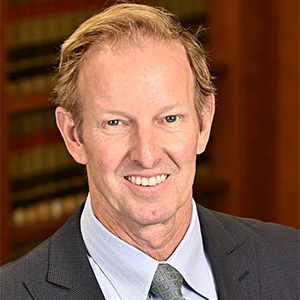 TIMOTHY CASEY
TIMOTHY CASEY
Director of Curricular Administration and Professor from Practice
Tim Casey will teach Professional Responsibility and provide support for the non-senate law faculty. He started his teaching career at Columbia Law School, where he established a Criminal Practice Clinic and received the Presidential Award for teaching. He also held an appointment as a professor of law at Case Western Reserve University. And he received a Fulbright award for research and teaching in Buenos Aires, Argentina.
Most recently, Casey served as the director of the STEPPS Program and professor in residence at California Western School of Law, where he oversaw an innovative program in legal ethics and lawyering skills. He also was a visiting professor at the University of San Diego School of Law. Before entering legal academia, he practiced law as a public defender in New York City.
Casey is an internationally recognized expert in experiential legal education. His research interests include legal ethics, surveillance and civil liberties, problem-solving courts and experiential pedagogy. He is a co-author of Legal Ethics in the Practice of Law (Carolina Academic Press, Fifth Edition, 2019), and his scholarship has appeared in law reviews including UC Davis Law Review and SMU Law Review. He serves as chair of the Legal Ethics Committee of the San Diego County Bar Association, a board member for local and international non-profit organizations, and a member of the editorial board for the peer-reviewed Clinical Law Review.
He received his B.A. from Boston College, J.D. from UC Law San Francisco and LL.M. from Columbia Law School.
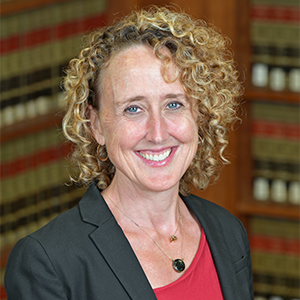 HANNAH GARRY
HANNAH GARRY
Executive Director of the Promise Institute and Professor from Practice
Hannah Garry joins UCLA Law as executive director of the Promise Institute for Human Rights and professor from practice. Garry has devoted her legal career to seeking justice and accountability for human rights abuses and atrocity situations across the globe, while making the U.S. a destination for the study and practice of human rights law.
She joins UCLA Law from USC Gould School of Law, where she was clinical professor of law and founding director of the International Human Rights Clinic for 12 years. Her areas of teaching and scholarship include international criminal law, transitional justice, international human rights law and international refugee law. She has supervised student attorneys in the clinic on cases and projects nationally and internationally that address atrocity crimes, refugee rights, fair trial rights, gender justice, human trafficking and systemic racism.
Garry’s career as an international human rights advocate, scholar and teacher took root when she was a graduate student at Oxford University’s Refugee Studies Centre. After graduation, she was hired by Oxford as a field researcher visiting refugee camps throughout Uganda and Kenya for two years where she witnessed and documented first-hand the abuses refugees endure in exile while under the protection of the international community.
Garry has held many other academic and expert legal advisor positions, including in international criminal courts and leading human rights organizations, and she has been quoted widely in major media outlets. Last year, she was a Fulbright Scholar at the University of Oslo Law’s PluriCourts Centre in Norway.
Garry earned her J.D. from UC Berkeley and master’s in international affairs from Columbia University.
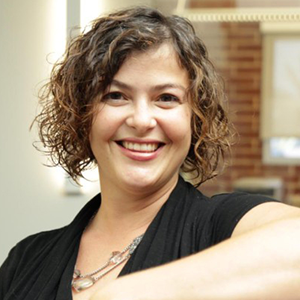 MELISSA GOODMAN
MELISSA GOODMAN
Executive Director of the Center on Reproductive Health, Law, and Policy
Melissa Goodman joins UCLA Law as the inaugural executive director of the Center on Reproductive Health, Law, and Policy after a five-year tenure as the legal and advocacy director for the ACLU of Southern California. There, Goodman led 60 attorneys across Southern California and oversaw the department’s visioning and strategy, strategic planning, intersectional issue and cross-team collaboration and resource allocation. In doing so, she helped lead statewide legislative, electoral and organizing strategy. She also co- chaired the national ACLU’s Gender Justice Task Force.
Goodman previously spent a decade as the ACLU SoCal’s Audrey Irmas Director of the LGBTQ Gender and Reproductive Justice Project, and as a senior litigation and policy counsel for reproductive and LGBTQ rights at the New York Civil Liberties Union. In those roles, she led and participated in reproductive justice, LGBTQ and gender equity litigation, as well as policy advocacy campaigns. Along the way, Goodman led or co-counseled an array of high-profile cases, including those involving pregnant unaccompanied immigrant minors; gay, bisexual and transgender prisoners; and same-gender couples.
Goodman clerked for Judge Frederic Block of the U.S. District Court for the Eastern District of New York. She earned her B.A., magna cum laude, from New York University and her J.D. from NYU School of Law.
New Lecturers
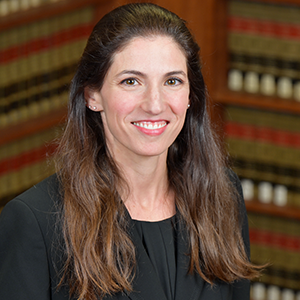 EMILY CHURG
EMILY CHURG
Lecturer in Law
Emily Churg teaches Legal Research and Writing. She previously practiced complex commercial litigation at WilmerHale and ran her own bar exam preparation company. She has also taught legal writing at USC Gould School of Law and undergraduate writing at Arizona State University.
She earned her B.A., with honors, from UC Santa Cruz; her Ph.D. in rhetoric, composition and linguistics from Arizona State; and her J.D., Order of the Coif, from UC Davis School of Law. After law school, she clerked for Judge S. James Otero of the U.S. District Court for the Central District of California.
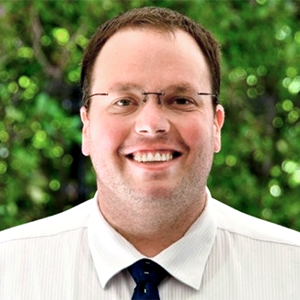 THOMAS WANEBO
THOMAS WANEBO
Lecturer in Law
Thomas Wanebo teaches Legal Analysis, Writing, and Research for LL.M. students. He currently works as a trial attorney at Neighborhood Legal Services of Los Angeles County, defending low-income families against eviction. He began his career as a litigation associate at Irell & Manella in Los Angeles.
Wanebo earned his B.A. from Colorado State University and his J.D. from UCLA Law, where he was a senior editor of the UCLA Law Review. His publications include the article “Remote Killing and the Fourth Amendment: Updating Constitutional Law to Address Expanded Police Lethality in the Robotic Age,” which appeared in the UCLA Law Review.
New Fellows
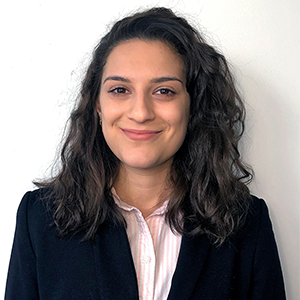 MELODI DINCER
MELODI DINCER
UCLA Institute for Technology, Law and Policy Fellow
Melodi Dincer will join UCLA Law in January 2024 as a fellow with the UCLA Institute for Technology, Law and Policy. Her work focuses on helping social movements fight algorithmic violence and build transformative futures.
She was previously an appellate advocacy fellow with the Electronic Privacy Information Center and has been a legal research fellow and clinical supervising attorney at NYU School of Law, where she earned her J.D. She earned her B.A. from Brown University.
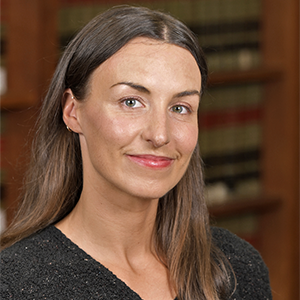 RUTHIE LAZENBY
RUTHIE LAZENBY
Shapiro Fellow in Environmental Law and Policy
As the Shapiro Fellow in Environmental Law and Policy for 2023–25, Ruthie Lazenby will be focusing on energy law and regulation. She was previously a staff attorney in the Environmental Justice Clinic at Vermont Law School and a legal fellow in the environmental justice program at New York Lawyers for the Public Interest.
She earned her B.A. from Wesleyan University and her J.D. from Yale Law School, where she was an editor of the Law and Political Economy Blog.